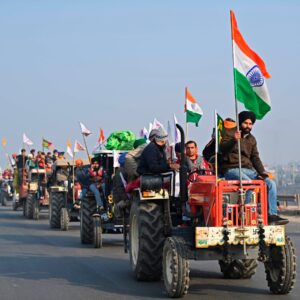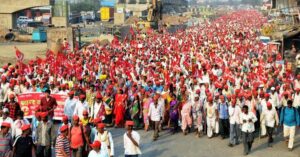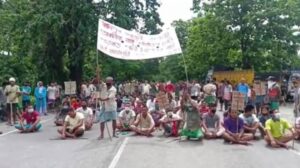Last Updated on 02/02/2021 by Aish K

The flaw in the farm bills will have an impact on all the farmers in the country, except that the gravity of the impact will vary. One reason why it’s mainly the Punjab and Haryana farmers that are at the forefront, is because their dependency on the government procurement at MSP and the mandis is much more than the others. On an average, 90% – 95% of the total produce is sold in the market.
The dominant crops also vary when we compare the various states. In Punjab and Haryana, the paddy crops and wheat acquire a higher proportion of the total produce while in Andhra Pradesh and Telangana, there’s more variety and with respect to that, lesser dependency on procurement of crops by the government. Thereby, the farm bills do not have such an intensifying effect on them in the short run.
The states of Punjab and Haryana have a higher number of medium and large farmers than the other protesting states. This means that the states which have more of the poor or tenant farmers, cannot join protests without being granted the permission to do so by the landlords.
The government of Punjab and Haryana alongside other regional parties there, have also maintained their stance during the protests and have supported the affected. Shiromani Akali Dal Leader, Hardinat Kaur Badal has even quit the cabinet in solidarity with the protests. However, so far the state government of states like Andhra Pradesh and Telangana haven’t put forward their stance on the matter.
We saw the Maharashtra Chief Minister Udhav Thackeray joining the protesting farmers’ voices, asking “Anyone who speaks for labourers and farmers, are they anti-national?”, during an interaction with the media in December last year.
On a contradictory note, though he took a stance on supporting the protesting farmers but his political party, Shiv Sena had voted in favour of the concerned farm bills.
“If BJP leaders know farm laws so well, then why are they not going to sit with the protesting farmers to explain it to them? Why are they just speaking on camera and doing press conferences?” the leader said.
Devandra Fadnavis, head of the national committee of agricultural reforms, firmly believes that the state government is attempting to instigate the farmers furthermore. However, marking an oddity in the series of event, Punjab CM Amarinder Singh and then MP CM Kamal Nath were also part of the Fadnavis committee that had recommended an open policy for the farmers.

In Nasik, the tomato, potato and onion growers also joined the protest of the farmers but with the sole intention of bringing the produce under the MSP, which will ultimately bring down the rate of uncertainity of their prices.
A prime reason behind why the farmers in Maharashtra are still at a safe distance from joining the protest in a full fledged manner is because their state was the first to adopt Model APMC Act 2003, aimed at bringing about agricultural reform and lowering the gravity of dependency of the farmers’ on the APMC’s. This eventually brought about higher incomes for the state farmers.

The farmers in Assam are not all legally recognised to be able to hope if they would be able to benefit much from the public policies in agriculture. Rice forms 90% of the total agriculture there, but the procurement of the produce at a stable MSP is not present there. The region is also struck by frequent floods and the effects thereafter.
The Public Information Bureau’s most recent report states that Assam produces 4.2% of the total rice produced in India. However, only a mere 0.2% of farmers avail procurement of their produce by the Food Corporation of India. This implies that a majority of the farmers have had to deal with low price rates of rice in the open market. Assam’s cropping intensity is seemingly the lowest, which is 146% amongst the rice producing states. Due to all these reasons there’s little interest amidst the landed class while the marginally weak and small farmers continue to rely on migration for a better livelihood.
Assam does not have a strong basis for infrastructural set up in agriculture. It has only about 24 regulated APMC markets do not have a strong hold on being able to curtail the liberty of the farmers there to dispose of their produce.
Meanwhile, we also cannot undermine that Assam has not benefited remarkably from private sector investments in agriculture as well. But the farm bills encourage this endeavour of more of the private sector investments. Therefore, they cannot act optimistic with regards to such policies. The APMC still has an impact in citing price rates for them.
What is the flaw in the bill? Or is it just a politically induced agitation?
Prime Minister Narendra Modi had restrained himself for long from giving any political angle to the protest but then claimed that the opposition are taking advantage of the situation by misleading the protestors regarding the farm bills. He said his heart bleeds for the farmers and in no way is the government trying to do away with the Minimum Support Price (MSP).
The promise made by the Modi government in 2014 is yet to come true as the farmers still await for their income to double by 2022. They want MSP to gain a legal aspect.
Even though the government tried to calm down the agitated protestors by claiming that they are free to sell the produce anywhere, at any price. But these claims do not have a permanency in nature. How can the farmers be assured of the future circumstances?
The private corporate bodies and traders still pose a threat upon the farmers and their income. Their distrust in the government has had a strong role to play during these protests. Thereon, only legalising the MSP in the form of a provisional law can be helpful in gaining back their trust.










